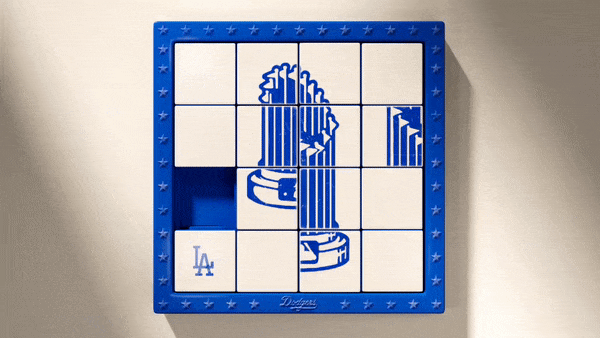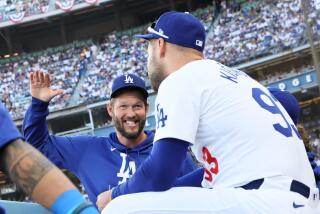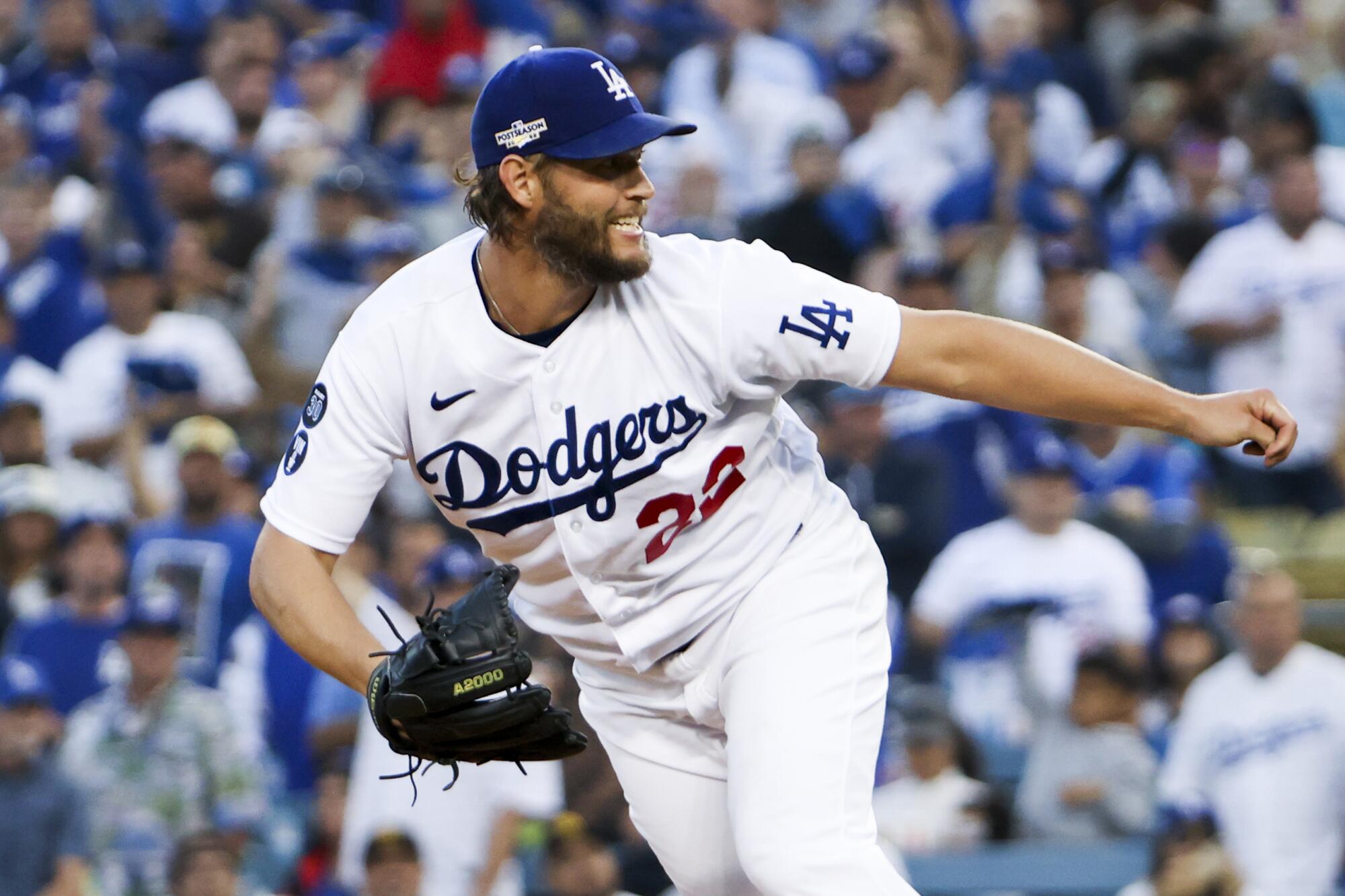
- Share via
PHOENIX — Clayton Kershaw first confronted the conundrum almost 10 years ago.
On the verge of free agency ahead of the 2014 season, and having already become entrenched as the face of the Dodgers franchise following his second of three Cy Young Award wins, the left-hander faced a crossroads during contract negotiations with the club that offseason.
For one of the first times as a major leaguer, Kershaw was forced to take a hard look at his long-term future — to start mapping out his career in a way the surefire Hall of Famer hadn’t needed to before.
At times during that process, Kershaw recalled, “There were talks of doing 10, 15 years,” the kind of ultra-length deal likely to span the rest of his playing days.
The only problem?
“I just never was comfortable committing to be good for that long,” Kershaw said.
And nearly a decade later, that philosophy hasn’t changed.
The Dodgers have been a virtual lock to make the postseason the last 10 years. This season? Nothing is a given and that might make it fun.
Now, just as back then, the 35-year-old pitcher has been careful to only “commit what you can commit to fully.”
And by “fully,” Kershaw means what he knows he can do well.
It’s why, even as he remains unsure about when he might retire, how long he’ll remain in a sport he has dominated for a generation, and whether he’ll ultimately finish his career in L.A. or back home in Texas, Kershaw has adopted a year-by-year approach to his future in baseball.
After completing the seven-year, $215-million deal he signed with the Dodgers in 2014, he has entered free agency the last two offseasons looking for nothing more than a one-season pact, bypassing the opportunity to net another lucrative, long-term deal for something much more valuable at this stage of his life and career.
Freedom.
“I didn’t plan on it like that,” Kershaw said. “I think it’s just a good way for me to go where I’m at.”
Kershaw referenced his feeling of “freedom” several times in an interview this spring, discussing his present outlook and future plans while gazing across a back field at the Dodgers’ Camelback Ranch facility.
The 2014 National League MVP and all-time franchise strikeout king still feels the pressure to perform. Entering his 16th MLB season, he still views each contract he signs as a promise he’ll be great.
It all emanates from the cut-throat fire that has fueled his historic career.
“I feel fully committed to this year. It might be [the same] next year. But I love the freedom of not being committed … I like the ability to reset after every year.”
— Clayton Kershaw, Dodgers pitcher
But now, Kershaw also knows he’s closing in on a possible finish line. That the moment his performance dips, or his motivation wanes, or his body breaks down to a point beyond repair, he won’t be indebted to anyone or any team.
He won’t have made a commitment he’s incapable of completing.
He’ll be able to walk away from the game, whenever the time comes, on his terms.
“Every time you sign that contract for a team, in my head, you are 100% committed to doing whatever you can to help your team win,” Kershaw said. “And that’s not easy. You have to be good. It’s not a, ‘Oh, you should be good.’ No. You have to be. And if you’re not, you’re not fulfilling your commitment.
“It just turns out that right now, I feel fully committed to this year. It might be [the same] next year. But I love the freedom of not being committed. … I like the ability to reset after every year.”
The weight began to be lifted the minute the final out was recorded, an exhalation that had been a dozen seasons in the making.
Kershaw knew winning a World Series would be special. He figured it would release the frustrations built up over years and years of October disappointment.
But what he hadn’t been expecting, when he and the Dodgers finally broke through with their 2020 title, was that his long-awaited championship would loosen the chains of his own persona, and pave the way for a new perspective as he started thinking about the rest of his career.
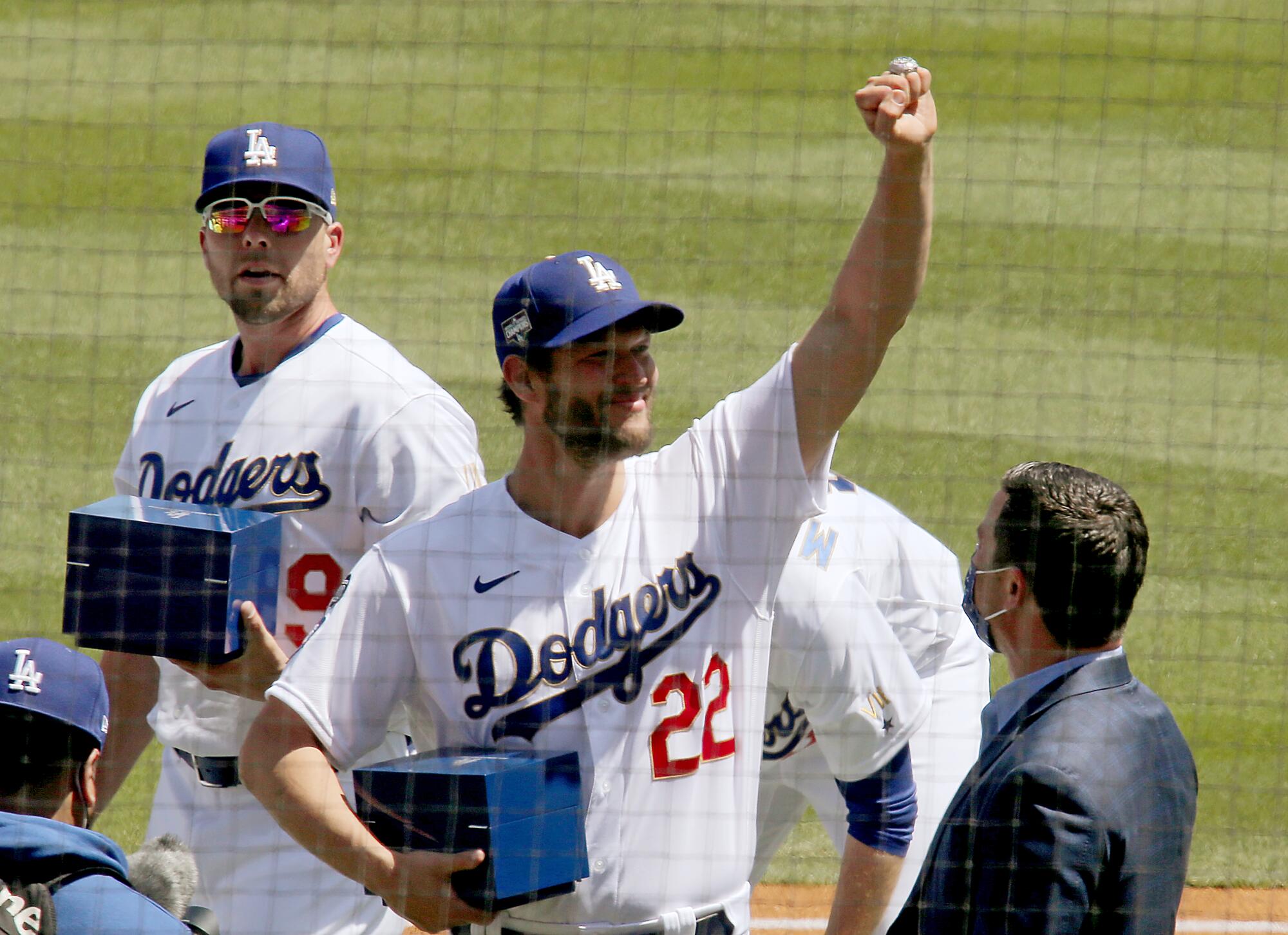
“I think having that [World Series] definitely started letting me relax a little bit more,” Kershaw said. “I didn’t realize I had been carrying that weight that much.”
Indeed, just about everyone around the Dodgers has noticed a shift in Kershaw in recent years.
How his stoic facade has started to fade. How his once-fearsome aura has slowly softened.
It hasn’t been a total transformation. He still follows his strict start-day routine. He still snaps at himself in bullpen sessions. He’ll still knock over a chair — only half jokingly — in heated games of clubhouse pingpong.
But when he turns off the switch, and navigates the quiet moments in between, he’s more willing to sheath that razor-sharp edge.
He has become more open with teammates. More self-deprecating in interviews. More willing to appreciate the little joys he once let pass right on by.
“Obviously, he knows he’s on the other side of his career,” pitching coach Mark Prior said. “So I think he’s just trying to enjoy all the other little things that sometimes get lost in the shuffle.”
Said former Dodgers pitching coach Rick Honeycutt: “He’s always put a lot of that extra pressure on himself. And he’s still a great competitor. You see him still compete at this high level. He wants to continue that. But I think he’s able to separate things a little bit better.”
During an outing in a back field minor league game this month, for example, Kershaw visited with his wife and kids between innings, going back and forth from the mound to the dugout to the foul-ground railing behind which they were watching.
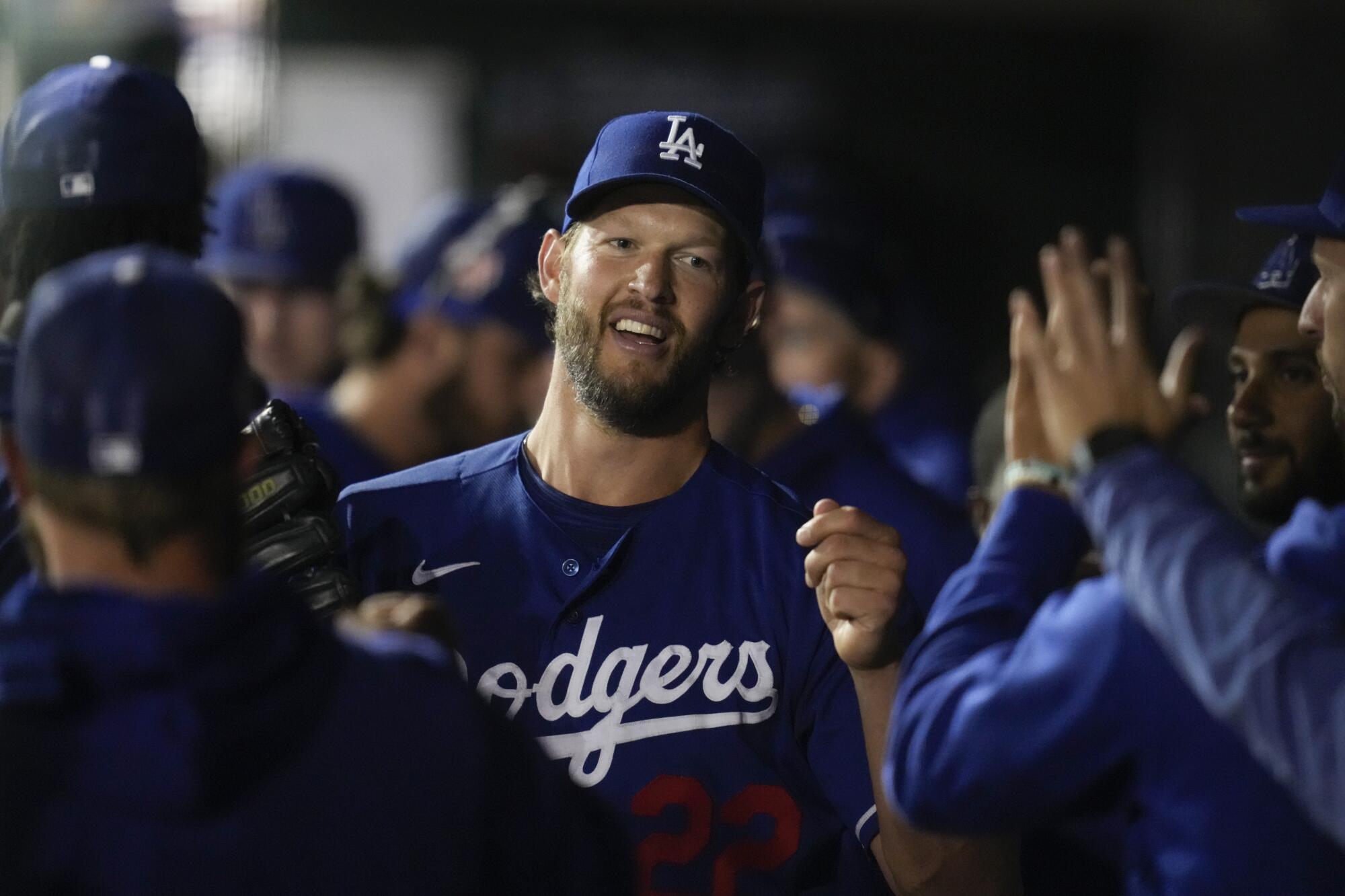
A week later, Kershaw stood alongside Prior during a morning throwing session for Dodgers pitchers. After closely watching reliever Caleb Ferguson’s mechanics, the once-reluctant leader approached the fellow left-hander to share his observations, picking a subtle moment to impart some of the wisdom he has gathered over 15 seasons.
“Being on a stage like this, being in so many big games, knowing what he expects out of himself, I think there’s a lot that comes with that,” said catcher Austin Barnes, who has been around Kershaw longer than any other player in the Dodgers clubhouse. “I think he’s just figured out a good balance for himself.”
And Kershaw’s ability to go year by year, following up his $17-million signing in 2022 with a $21-million renewal this past winter, has only amplified that shift, replacing past pressures of expectation and obligation with the new prerogative he has carried with him all camp.
“When it’s your choice — like, I don’t have to play anymore, so this is your choice to come and play this game — I don’t take that for granted,” he said. “You’re not trudging through another season, grinding through it. Now, we’re here because I love baseball, I love this team and I think we can be good. So that’s where, I guess there’s a little freedom in that.”
As Kershaw’s mindset has changed in recent years, so has his role on an ever-evolving Dodgers team.
Though he’s still one of the majors’ best pitchers when healthy — something he reaffirmed with a 12-3 record, 2.28 ERA and first career All-Star Game start last season — he is no longer the primary ace on the staff.
Though he maintains his own lofty expectations, the club’s fortunes aren’t nearly as dependent upon him as they used to be.
Instead, Kershaw has taken on responsibilities his old closed-off self would have never allowed.
He has quietly guided younger rotation-mates such as Tony Gonsolin and Dustin May — even if he feels uneasy about being publicly tagged as a mentor.
“There’s no such thing as a forced leader. Nobody will respond to that,” Kershaw said. “I think my strong suit is the one-on-one, one-off [conversations]. Helping guys where I see I might be able to.”
He has accepted his place as one of the roster’s elder statesman, too, discussing his veteran status last season with a sheepish smile across his face.
“I don’t know when I turned into, like, I guess, a veteran,” he said with a soft, uncertain chuckle, uttering a word that still sounded uncomfortable passing through his lips. “I don’t know what year that happened.”
Now, however, he is slowly embracing it, moving into a “different headspace,” as president of baseball operations Andrew Friedman described it, “than he had eight or nine years ago.”
“I don’t think it’s that unusual with players, as they get into their 30s,” Friedman said.
With Kershaw, though, the change has been starker than most.
What it is all leading to beyond this season remains unclear.
Just like last year, Kershaw considered signing with the Texas Rangers this offseason, a hometown allure for the Dallas native that will linger every time he enters the free-agent market. He hasn’t ruled out the possibility of this being his last season, either, saying at the start of camp that “it’s all on the table, for sure.”
That’s why, for now, he’s focused only on his latest one-season commitment, settling back in with the Dodgers for at least one more year.
“I think the choice, the elected time to be here, it does change your perspective a little bit,” Kershaw said. “You’re not forced to be here. Like, this was a choice for our family. So you might as well enjoy it.”
More to Read
Are you a true-blue fan?
Get our Dodgers Dugout newsletter for insights, news and much more.
You may occasionally receive promotional content from the Los Angeles Times.

